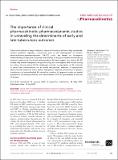The importance of clinical pharmacokinetic–pharmacodynamic studies in unraveling the determinants of early and late tuberculosis outcomes
Abstract
Tuberculosis remains a major infectious cause of morbidity and mortality worldwide. Current antibiotic regimens, constructed prior to the development of modern pharmacokinetic-pharmacodynamic (PK–PD) tools, are based on incomplete understanding of exposure–response relationships in drug susceptible and multidrug resistant tuberculosis. Preclinical and population PK data suggest that clinical PK–PD studies may enable therapeutic drug monitoring for some agents and revised dosingf or others. Future clinical PK–PD challenges include: incorporation of PK methods to assay free concentrations for all active metabolites; selection of appropriate early outcome measures which reflect therapeutic response; elucidation of genetic contributors to interindividual PK variability; conduct of targeted studies on special populations (including children); and measurement of PK–PD parameters at the site of disease.
Citation
McCallum , A D & Sloan , D J 2017 , ' The importance of clinical pharmacokinetic–pharmacodynamic studies in unraveling the determinants of early and late tuberculosis outcomes ' , International Journal of Pharmacokinetics , vol. 2 , no. 3 , pp. 195-212 . https://doi.org/10.4155/ipk-2017-0004
Publication
International Journal of Pharmacokinetics
Status
Peer reviewed
ISSN
2053-0846Type
Journal item
Collections
Items in the St Andrews Research Repository are protected by copyright, with all rights reserved, unless otherwise indicated.

